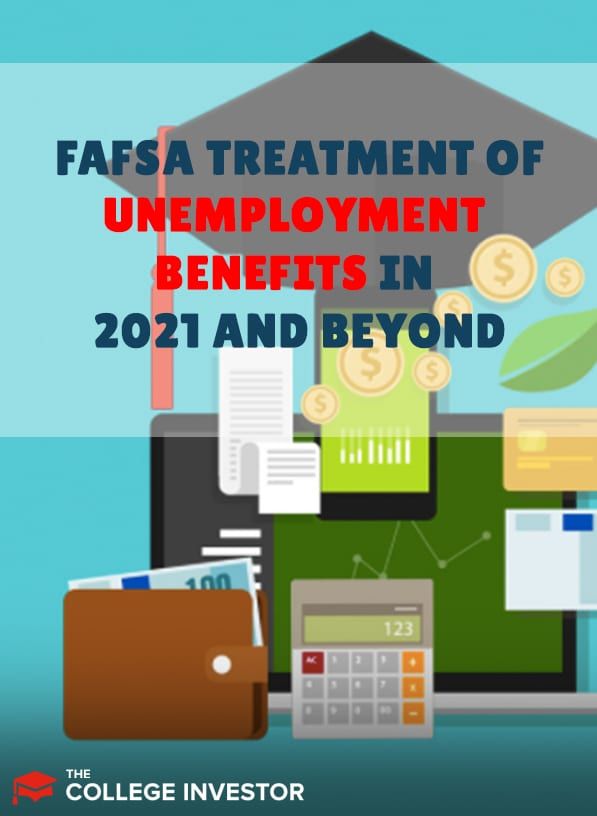
The American Rescue Plan Act (ARPA) made the first $10,200 of unemployment benefits tax-free per taxpayer for those with incomes under $150,000.
But some eligible taxpayers had already filed their taxes before ARPA passed. In these cases, the IRS sent refunds for any income taxes that were paid on unemployment benefits.
These events may impact the FAFSA treatment of unemployment benefits in 2021 as it could make some applicants' AGI look higher than it should. Thankfully, the Department of Education has recently announced that students can fix this mistake on their FAFSAs by working with college administrators. Here's what you need to know.
New AGI Exclusions For Unemployment Benefits
As a result of the ARPA, up to $10,200 of unemployment benefits are now excluded from income for single taxpayers. For married taxpayers, up to $20,400 of unemployment benefits can be excluded if both received unemployment benefits and filed a joint income tax return.
These changes can affect the FAFSA treatment of unemployment benefits on the 2022-23 FAFSA as it's based on 2020 income. Applicants began filing the 2022-2023 FAFSA on October 1, 2021.
Since ARPA was signed into law on March 11, 2021, some taxpayers may have already filed their federal income tax returns beforehand and reported the unemployment benefits as part of their adjusted gross income (AGI). The IRS is sending these taxpayers a refund.
But taxpayers who filed their returns after this date won't have the unemployment benefits reported as income on their tax returns. So their returns will report a lower AGI than taxpayers who filed their federal income tax returns before the change.
Potential For Confusion On The FAFSA
This can cause confusion for students applying for financial aid. The FAFSA and CSS Profile both use the AGIs that are listed on federal income tax returns. It certainly doesn’t seem fair for some students to have a higher AGI simply because filed their tax returns earlier.
Students who used the IRS Data Retrieval Tool to transfer their income and tax information from federal income tax returns into the FAFSA may also be affected. Also, students may be wondering whether they should report the amount excluded from income as untaxed income on the FAFSA.
This is important because a $10,000 change in income on the FAFSA can yield about a $3,000 to $5,000 change in the Expected Family Contribution (EFC). And this will, in turn, reduce a student's eligibility for need-based financial aid.
The change can also affect whether the student qualifies for the Simplified Needs Test and Auto-Zero EFC. The Simplified Needs Test disregards all assets for certain applicants with parent income under $50,000. Auto-Zero EFC sets the expected family contribution to zero for certain applicants with parent income of $27,000 or less.
The FAFSA treatment of unemployment benefits isn't the only way students could be impacted by the ARPA changes. It could also affect the annual certification of income on income-driven repayment plans.
U.S. Department Of Education Issues New Guidance
The U.S. Department of Education published an updated Electronic Announcement on October 15, 2021 to address this problem.
According to the Electronic Announcement, the U.S. Department of Education is using its authority under the Heroes Act of 2003 to waive the requirement to report the tax-free unemployment benefits as untaxed income on the FAFSA. The U.S. Department of Education is also removing the untaxed unemployment benefits from AGI, treating it as a correction instead of professional judgment.
As a result of this new guidance, college financial aid administrators are now required to make corrections to a student’s FAFSA if and when they become aware that the FAFSA included unemployment benefits of the student, parent or spouse.
Advice For FAFSA Applicants
College financial aid administrators can only make corrections to the FAFSA treatment of unemployment benefits when they become aware of errors.
So students should let their administrator know if they (or their parent or spouses) received unemployment benefits in 2020. And this is especially important if their 2020 tax returns were filed before the ARPA passed in March 2021.

Mark Kantrowitz is an expert on student financial aid, scholarships, 529 plans, and student loans. He has been quoted in more than 10,000 newspaper and magazine articles about college admissions and financial aid. Mark has written for the New York Times, Wall Street Journal, Washington Post, Reuters, USA Today, MarketWatch, Money Magazine, Forbes, Newsweek, and Time. You can find his work on Student Aid Policy here.
Mark is the author of five bestselling books about scholarships and financial aid and holds seven patents. Mark serves on the editorial board of the Journal of Student Financial Aid, the editorial advisory board of Bottom Line/Personal, and is a member of the board of trustees of the Center for Excellence in Education. He previously served as a member of the board of directors of the National Scholarship Providers Association. Mark has two Bachelor’s degrees in mathematics and philosophy from the Massachusetts Institute of Technology (MIT) and a Master’s degree in computer science from Carnegie Mellon University (CMU).
Editor: Clint Proctor Reviewed by: Robert Farrington
